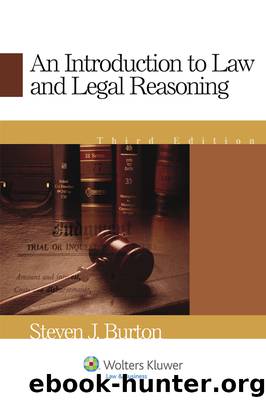An Introduction to Law and Legal Reasoning (Academic Success Series) by Burton Steven J

Author:Burton, Steven J. [Burton, Steven J.]
Language: eng
Format: epub
Publisher: Aspen Publishers
Published: 2007-01-09T16:00:00+00:00
B. General Purposes of Law
To avoid misunderstanding, I should comment further on the law’s purposes. In the aggregate, legal rules, principles, and policies should describe a possible world to be brought into existence by the coordinated actions of citizens and the state. The traffic laws, for example, represent a complex set of coordinated actions that should be taken by motorists in response to various colored lights and signs with various shapes. It is not hard to imagine that world. To a remarkably large extent, motorists are guided by the law to take those actions and thus to realize the traffic laws’ vision in the real world. Of course, other laws, like those prohibiting the sale or use of illicit drugs, are notoriously ineffective. The social world is brought into conformity with such laws, if at all, when legal sanctions (enforced losses of liberty or property imposed for disobedience) are imposed on violators.
We assume that society would be different if the law did not exist. People generally abide by the law due to a habit of compliance and a sense of obligation, or to the practical threat of its sanctions, or from both kinds of motive. People in many situations would not behave in the same ways if there were no formal expressions of what the society regards as minimally honorable behavior and no organized criticism, such as sanctions, for misbehavior. We also assume that society generally is better off because the law exists. The laws should encourage valued behavior, discourage disvalued behavior, and guide conduct accordingly. If the laws have an effect on society, they should help make it a better society in which to live.
The abstractness of this broad perspective can be reduced somewhat by identifying two frequently competing general purposes underlying the largest part of the law. 4 First, the law should contribute to a more orderly society. People at times will find themselves in conflict in any society with any form of social organization. Serious conflicts sometimes would result in fights, feuds, and the useless destruction of life and property; if left unsettled, even nonviolent disputes can be highly disruptive to the disputants and others. Society would be better off if serious conflicts more often were resolved peacefully. An offer of peaceful dispute settlement procedures, such as adjudication, may induce many people to seek peaceful resolutions of serious conflicts that are not settled by other means .
A society could settle persistent disputes in a number of peaceful and less costly ways not involving cases, rules, lawyers, and courts. Many societies in many times and places have used such alternatives, and some are being used increasingly in the United States for some kinds of disputes. For example, we could flip coins, appoint a “wise” man to rule by fiat, leave disputants to work out their differences by negotiation, or leave them to agree to employ third parties to mediate or arbitrate privately, insofar as they can without a compulsory backup. The law, however, is trying to do more than settle disputes peacefully.
Download
This site does not store any files on its server. We only index and link to content provided by other sites. Please contact the content providers to delete copyright contents if any and email us, we'll remove relevant links or contents immediately.
| Law Office Education | Law Office Marketing & Advertising |
| Law Office Technology | Legal Services |
| Paralegals & Paralegalism | Reference |
| Research |
Every Landlord's Legal Guide by Janet Portman & Stewart Marcia & Ralph Warner(1323)
Philosophy of law a very short introduction by Raymond Wacks(1297)
Writing to Win: The Legal Writer by Steven D. Stark(1278)
How Innovation Works by Matt Ridley(1277)
Drafting Contracts: How and Why Lawyers Do What They Do, Second Edition by Stark Tina L(1170)
Law Man by Shon Hopwood(1138)
Nolo's Essential Guide to Divorce by Emily Doskow(1099)
So You Want to be a Lawyer by Lisa Fairchild Jones Esq(1096)
Nolo's Encyclopedia of Everyday Law: Answers to Your Most Frequently Asked Legal Questions by Shae Irving & Nolo (Editor)(976)
Garner's Modern English Usage by Bryan Garner(945)
Profit From Your Idea: How to Make Smart Licensing Deals by Attorney Richard Stim(940)
Best Practice by J.A. Armstrong(927)
Introduction to the study and practice of law in a nutshell by Kenney F. Hegland(894)
International Trade and Business: Law, Policy and Ethics by Gabriël Moens & Peter Gillies(868)
Nolo's Encyclopedia of Everyday Law: Answers to Your Most Frequently Asked Legal Questions by Shae Irving; Nolo (Editor)(861)
Data Protection: A Practical Guide to UK and EU Law by Carey Peter(838)
Researching the Law: Finding What You Need When You Need It (Aspen Coursebook Series) by Amy E. Sloan(800)
Everybody's Guide to Small Claims Court by Attorney Ralph Warner (Nolo)(783)
Credit Repair by Loftsgordon Amy(783)
